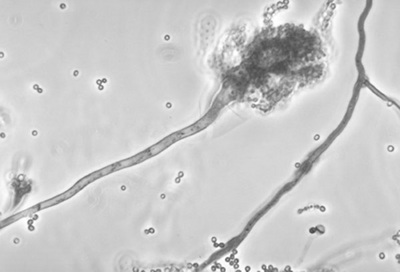1 of 2 Michigan meningitis deaths occurred at University of Michigan Hospital
One of two deaths in Michigan from a recent outbreak of fungal meningitis occurred at the University of Michigan Health System in Ann Arbor, hospital officials said Monday.
The patient died in late September from the illness, said spokesman Pete Barkey. The death is the only confirmed case at UMHS of fungal meningitis associated with the current outbreak, which has been linked to a batch of injectable steroids contaminated with a fungus. The injections are used to treat chronic back pain.
The hospital also has several other fungal meningitis cases that it has referred to the state to determine whether they are linked to the contaminated steroids, Barkey said.

The fungus Aspergillus fumigatus is blamed for causing a meningitis outbreak in nine states. Injectable steroids manufactured by the New England Compounding Center and distributed across the country are suspected of being contaminated with the fungus.
The newspaper reported that Lillian Cary, 67, died Sept. 30, after being treated with steroid shots at Michigan Pain Specialists of Genoa Township. The clinic, which also has an office in Ypsilanti, is one of four in the state that received steroids contaminated with the fungus.
As of Monday afternoon, 21 cases of fungal meningitis and two deaths from the illness have been reported in Michigan, according to the Centers for Disease Control and Prevention.
The Michigan Department of Community Health is expected to release updated case information Monday afternoon.
Michigan officials announced Friday that six cases of fungal meningitis had been linked to the contaminated steroids under investigation, and all six of those were identified by doctors at St. Joseph Mercy Ann Arbor.
The condition of the six patients being treated at St. Joseph Mercy Ann Arbor ranged from good to serious Sunday afternoon, said hospital spokeswoman Lauren Smoker.
Health officials in Michigan and across the country are working to notify patients who may have received injections of the contaminated steroid manufactured by the New England Compounding Center in Framingham, Mass. The center is under investigation by the Centers for Disease Control and Prevention.
Nationwide, 105 cases had been reported and eight people had died in nine states, according to the most recent information from the CDC.
The four clinics in Michigan that received shipments of the steroids contaminated with the fungus are:
- Michigan Pain Specialists in Brighton
- Michigan Neurosurgical Institute of Grand Blanc
- Neuromuscular & Rehabilitation in Traverse City
- Southeast Michigan Surgical Hospital in Warren
Michigan Pain Specialists also has a location at 135 South Prospect St. in Ypsilanti.
Washtenaw County Public Health tracks all cases of meningitis, and was aware of an increase in the number of fungal meningitis cases before they were linked to the CDC's investigation of the Massachusetts company, said public information officer Susan Ringler-Cerniglia.
Amy Biolchini covers Washtenaw County, health and environmental issues for AnnArbor.com. Reach her at (734) 623-2552, amybiolchini@annarbor.com or on Twitter. The Associated Press contributed to this report.


Comments
A A Resident
Tue, Oct 9, 2012 : 11:23 a.m.
Yes please, could the headline be changed? Right now, it sounds like UM Hospital was connected with the victims contracting the illness.
GoNavy
Mon, Oct 8, 2012 : 8:20 p.m.
I'm not certain what this article is trying to say to the reader. Many deaths occur at hospitals, for obvious reasons. That these two patients made it to the hospital for treatment should be lauded. On the other hand, the clinic where the patient received the shot was not in the headline - it was far lower in the article (5 paragraphs down). I ask again: What was the aim of the article, and the decision to put the University of Michigan Health System in the headlines?
BhavanaJagat
Mon, Oct 8, 2012 : 7:18 p.m.
It is indeed sad to know about the loss of life on account of contaminated drugs. I am glad to read that the six patients at St. Joseph Mercy Hospital are slowly recovering from this infection. I do hope that they have taken action to remove all the contaminated drugs from the market and have contacted all the patients to get screened. This incident is much worse than the Hepatitis infection that was spread by a hospital employee. I am still concerned about this Drug Company and its marketing policies as the use of steroids appears to be very common( over 101 cases reported until now).